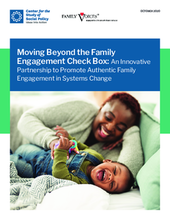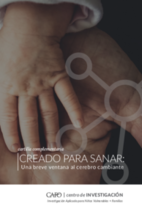Displaying 41 - 50 of 490
This case study examines the partnership that the Center for the Study of Social Policy (CSSP) and Family Voices undertook to create and implement a process for engaging families in the Pediatrics Supporting Parents (PSP) national initiative to promote the social and emotional development (SED) of young children.
This paper draws upon findings from a study which followed families through the process of pre-birth child protection assessment. It is argued that it is necessary to engage critically with the ‘first three years’ narrative that has become dominant in Scottish policy making and the impact this has had on child protection practice and the lives of families. The paper argues for a broader interpretation of ACEs focused on community and public health across the life course.
The authors of this study applied a sector‐wide analysis protocol that harmonized components of the Humanitarian Programme Cycle by the Inter‐Agency Standing Committee and of a framework to characterize the governance of early childhood development and education (ECDE) systems.
This study seeks to assess the prevalence of childhood neurodisabilities and related neurodevelopmental, emotional, behavioural and intellectual problems (NDEBIPs) among a cohort of children coming into care in an English local authority.
Este documento explora la neuroplasticidad y niños vulnerables.
The aim of the present study was to investigate cognitive functioning at age 8 years among 39 foster children (FC) compared to 36 children in a non-foster comparison group (NFC).
In the present paper, the Ecological Systems Theory is used to depict different vulnerabilities associated with orphanhood in the Ghanaian context.
In this commentary piece, Aisha K Yousafzai - of the Department of Global Health and Population at the Harvard TH Chan School of Public Health and the and Department of Paediatrics and Child Health at Aga Khan University - notes that "the evidence presented [in the Lancet Group Commission on the institutionalisation and deinstitutionalisation of children] and their call to action to ensure abandoned children can thrive in family-based care environments rather than in institutions matters now more than ever as the global community addresses unprecedented challenges to ensure a generation of children are not left behind with respect to their survival, health, development, learning, and safety."
In this episode of the Protected! Podcast, Hani Mansourian and Joan Lombardi - director of Early Opportunities - talk about how responsive care and early childhood experiences shape a child’s development and future wellbeing within families and communities.
This webinar includes presentations from panelists in Latin America discussing early childhood programming in the region, particularly in light of the COVID-19 pandemic.


